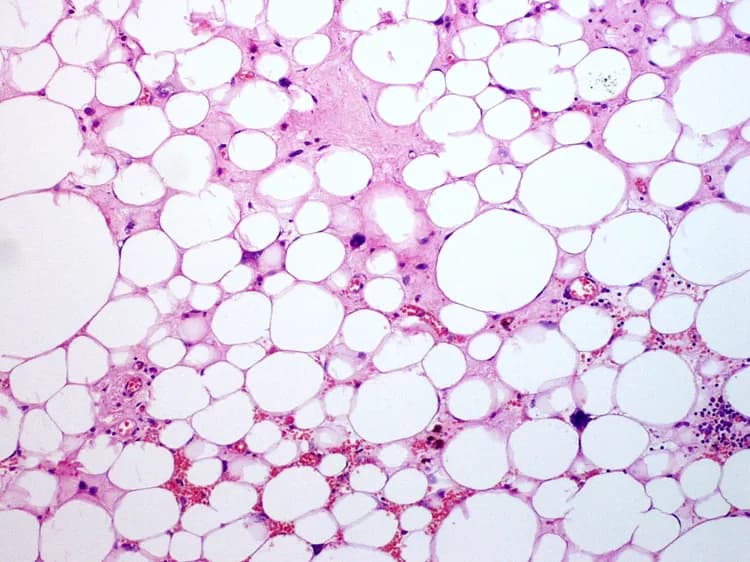What are the other Names for this Condition? (Also known as/Synonyms)
- Congenital Lipomatoid Tumor
- Embryonic Lipoma
- Lipoblastic Tumor
What is Lipoblastoma? (Definition/Background Information)
- Lipoblastoma is a rare, benign tumor of fatty tissue that is observed predominantly in very young children, below the age of 3 years. They are usually solitary
- These well-defined nodules may not cause any signs and symptoms and may be painless. The frequent sites of Lipoblastoma include the arms and legs
- There are no identified risk factors for Lipoblastomas and the cause is unknown. However, the involvement of chromosomal abnormalities has been detected in them
- If the tumors are asymptomatic, then no treatment may be necessary. But, if required, a complete surgical excision of the Lipoblastoma may be performed
- The prognosis is generally excellent, since these tumors are benign
Who gets Lipoblastoma? (Age and Sex Distribution)
- Lipoblastomas are typically found in children below the age of 3 years
- Both males and females are affected, though the incidence of the condition is higher in males
- There is no racial or ethnic preference observed
What are the Risk Factors for Lipoblastoma? (Predisposing Factors)
- The risk factors for Lipoblastoma are currently unknown, or have not been established
It is important to note that having a risk factor does not mean that one will get the condition. A risk factor increases ones chances of getting a condition compared to an individual without the risk factors. Some risk factors are more important than others.
Also, not having a risk factor does not mean that an individual will not get the condition. It is always important to discuss the effect of risk factors with your healthcare provider.
What are the Causes of Lipoblastoma? (Etiology)
- The exact cause and mechanism of Lipoblastoma formation is unknown
- However, specific genetic mutations linked to this condition have been detected on chromosome 8
What are the Signs and Symptoms of Lipoblastoma?
The signs and symptoms of Lipoblastoma are:
- Lipoblastomas are generally solitary, though more than one tumor may be observed
- Most common location of the tumor is the arms and legs
- Other locations include the mediastinum (between the lungs), retroperitoneum (abdominal cavity), chest, and back
- The nodules are well-defined, are less than 5 cm in size, and may not cause any pain
- Some tumors may not present any signs or symptoms
How is Lipoblastoma Diagnosed?
Lipoblastoma is diagnosed using the following tools:
- Complete physical examination with comprehensive evaluation of medical history
- Radiographic studies of the affected region
- Tissue biopsy: A tissue biopsy is performed and sent to a laboratory for a pathological examination. The pathologist examines the biopsy under a microscope. After putting together clinical findings, special studies on tissues (if needed) and with microscope findings, the pathologist arrives at a definitive diagnosis
- A differential diagnosis may be used to eliminate other tumor types
Many clinical conditions may have similar signs and symptoms. Your healthcare provider may perform additional tests to rule out other clinical conditions to arrive at a definitive diagnosis.
What are the possible Complications of Lipoblastoma?
There are no significant complications due to Lipoblastoma. However, tumors in the chest or abdomen may cause compression of the adjoining organs giving rise to associated signs and symptoms.
How is Lipoblastoma Treated?
Treatment measures for Lipoblastoma include the following:
- If there are no symptoms, then conservative treatment may be employed. However, periodic observation is maintained and if there is any pain, it can be controlled through pain medication
- Surgical excision with removal of the entire tumor is the standard treatment method used, which can ensure a complete cure
- Post-operative care is important: One must maintain minimum activity levels, until the surgical wound heals
- Post-operative follow-up care with regular screening and check-ups are important
How can Lipoblastoma be Prevented?
Current medical research has not established a way of preventing Lipoblastoma, which are tumors of infancy and childhood.
What is the Prognosis of Lipoblastoma? (Outcomes/Resolutions)
- Lipoblastomas are rare, benign, and generally asymptomatic tumors. In many cases, these tumors may not require any treatment
- The prognosis is generally excellent when the tumor is small and can be completely excised
Additional and Relevant Useful Information for Lipoblastoma:
The following DoveMed website link is a useful resource for additional information:
Related Articles
Test Your Knowledge
Asked by users
Related Centers
Related Specialties
Related Physicians
Related Procedures
Related Resources
Join DoveHubs
and connect with fellow professionals


0 Comments
Please log in to post a comment.